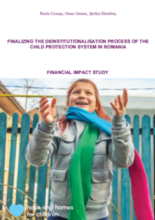Introduction
Children placed in institutional care are deprived of their fundamental right to living in a family environment. The Romanian state would greatly improve their situation, if it took care of preventing the separation of children from their family, instead of focusing on the current model - placing in care about 63,000 children, while hundreds of thousands of them still live in inhumane conditions. These are the ones that specialised public authorities pretend they do not see, because they lack the capacity for legislative framework design to prevent the separation of children from their family. The children leaving old-type child protection institutions do not have independent living skills, they rarely manage to find a job or start a family. The suicide rate among these young adults is significantly higher than the population’s average.
The thesis of this study is that, if the state were to invest money so that these children remain in a family environment, the amount invested would be significantly lower, which automatically allows the support of an increasingly higher number of children at risk – a research hypothesis demonstrated through longitudinal statistics analysed in this study, applied to 18 years of Hope and Homes for Children programmes – and the results regarding the harmonious development of children will be highly optimized. If parents want to keep their children with them, but they cannot feed them or they do not have a place to live, legislation should support them, so that families can remain together. It would cost less than caring for the children in a state institution, where they will be deprived from the authentic family environment.

